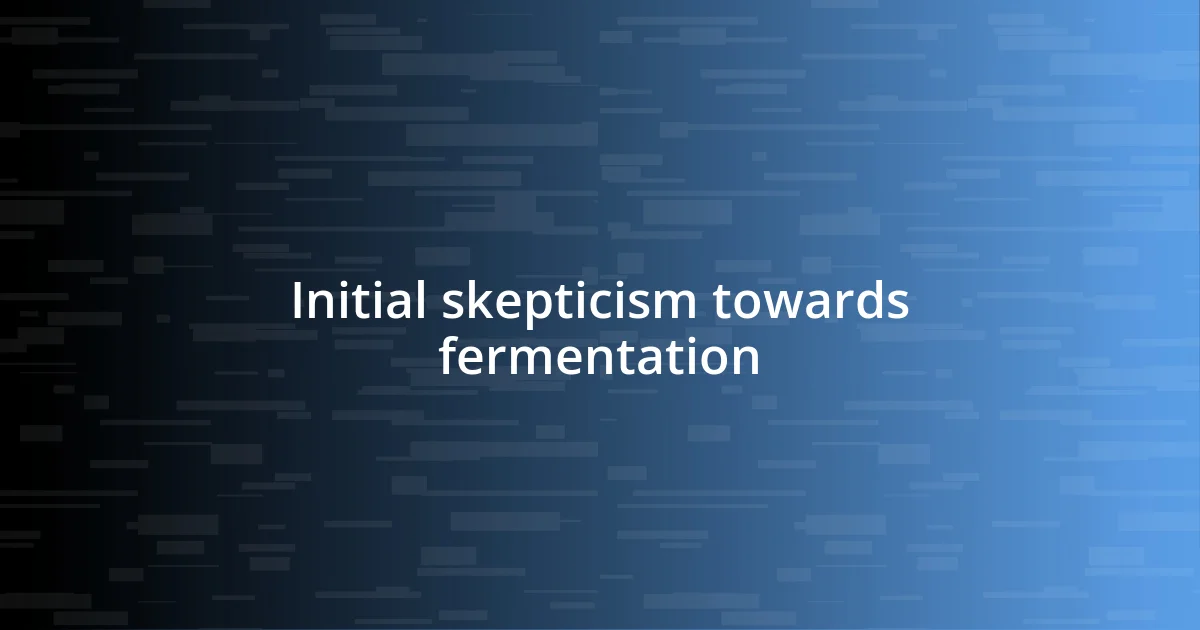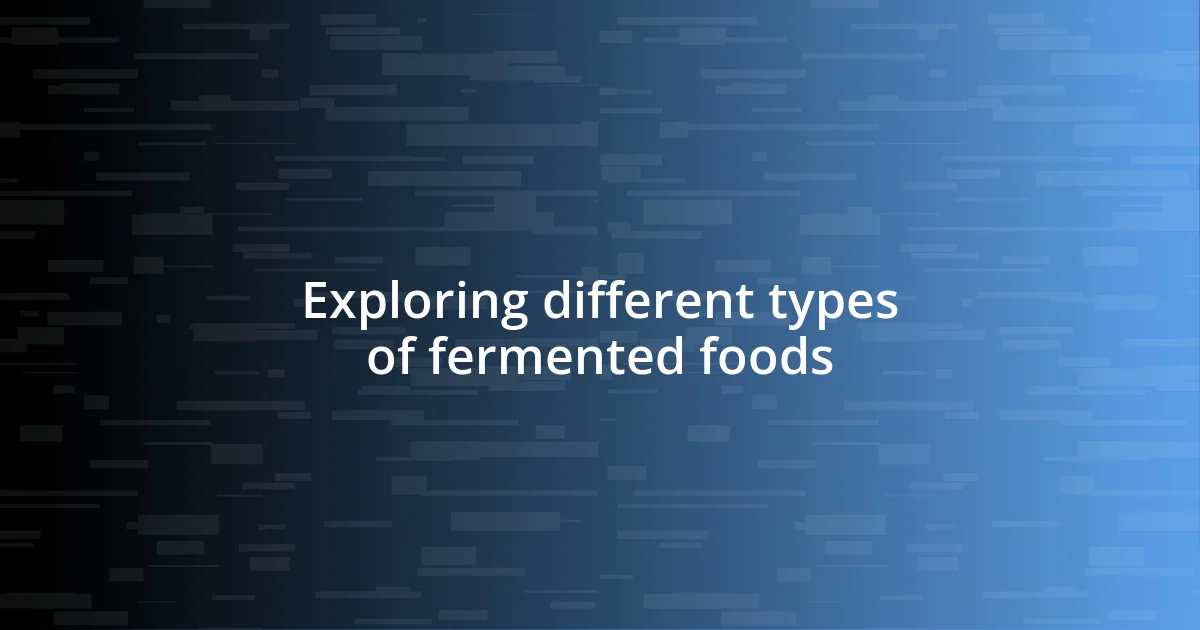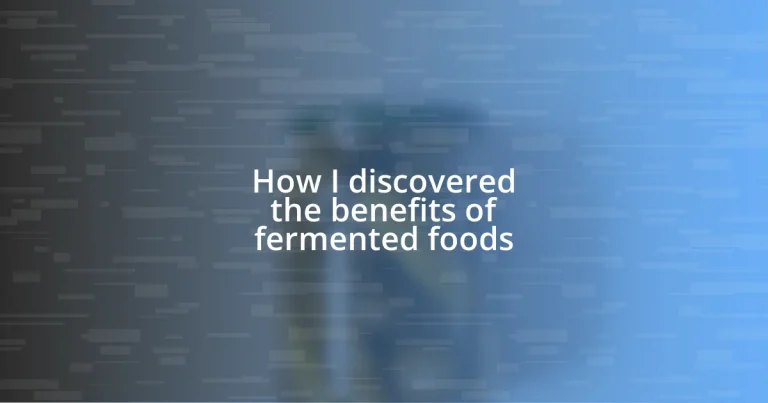Key takeaways:
- Initial skepticism about fermentation transformed into excitement after experiencing the health benefits and flavors of fermented foods like kimchi and kombucha.
- Understanding the science behind fermentation highlighted the essential role of microorganisms in creating complex flavors and supporting gut health.
- Incorporating fermented foods into meals enhanced culinary experiences and contributed to improved digestion and emotional well-being.

My journey with fermented foods
As I navigated through my wellness journey, I stumbled upon fermented foods almost by accident. I remember trying a homemade kefir smoothie at a friend’s house and feeling an unexpected burst of energy afterward. Could this tangy drink really be a game changer?
After that first taste, I took a deep dive into the world of fermentation. I started with kimchi, and the process fascinated me—chopping veggies, mixing spices, and waiting for the magic to happen. It was thrilling to see something so simple transform into a flavorful powerhouse over just a few days. Have you ever felt that touch of excitement when you watch your food evolve?
The more I explored, the more I realized how good these foods made me feel, not just physically but emotionally. There was something deeply satisfying about knowing I was nourishing my gut and myself. On tough days, a spoonful of sauerkraut felt like a little hug from the inside, reminding me to take care of my body with love. Isn’t it incredible how food can evoke such powerful feelings?

Initial skepticism towards fermentation
Initially, I had my doubts about fermentation. The idea of eating foods that had been deliberately grown with bacteria seemed strange and even a bit alarming. I remember sipping on my first kombucha, wondering if I was drinking something delicious or a science experiment gone wrong. Can you relate to that mix of curiosity and hesitation?
As I began to learn more, I found myself debating the health claims around fermented foods. It felt almost too good to be true that something so simple could positively impact gut health, digestion, and even mood. I recall a moment when a friend shared her glowing testimonials about sauerkraut, passionately describing its probiotic benefits. I wanted to believe her, but it took some time for that skepticism to wane as I sought evidence and testimonials from trusted sources.
Eventually, my hesitation transformed into intrigue and excitement. I found myself experimenting in my kitchen, craving that same combination of flavors and gut-supporting goodness I had experienced earlier. I’ll never forget the first batch of kimchi I made—the vibrant colors and the aroma filled my home. It felt like a culinary rite of passage, turning my previous doubts into a sense of accomplishment and enthusiasm for what I was creating. Isn’t it fascinating how overcoming skepticism can lead to profound changes in our lives?
| Aspect | Initial Skepticism |
|---|---|
| Curiosity about Fermentation | Mix of hesitation and intrigue |
| Health Claims | Debated benefits |
| Changing Mindset | Transitioned to excitement |

Understanding the science of fermentation
Understanding the science of fermentation reveals a fascinating interplay between microorganisms and food. As I dug deeper, I learned that fermentation is a natural process where bacteria, yeasts, or molds convert carbohydrates into alcohol or organic acids. It’s amazing to think that these tiny organisms are responsible for transforming simple ingredients into complex flavors and health benefits. The thought of microscopic life working diligently to promote my well-being felt like having a small, invisible army in my kitchen.
Here’s what I’ve discovered about the role of these microorganisms in fermentation:
- Bacteria (like Lactobacillus) help break down sugars, creating lactic acid, which preserves food and enhances flavor.
- Yeasts convert sugars into alcohol and carbon dioxide, a crucial step in making beverages like kombucha and beer.
- Molds (such as those used in soy sauce) play a part in breaking down proteins, giving depth and umami to various foods.
- Probiotics formed during fermentation can support gut health by balancing the microbiome and improving digestion.
As I stood in my kitchen, watching my latest batch of kimchi transform, it struck me how these microorganisms weren’t just changing cabbage; they were enriching my life with every crunchy bite. The more I learned, the more I appreciated the complex relationships at play in my food. It’s a reminder that health often lies in the simplest of ingredients and natural processes.

Exploring different types of fermented foods
Exploring the world of fermented foods opened my eyes to a diverse array of delicious options beyond my initial favorites. For instance, I had the chance to try miso for the first time in a cozy ramen shop. The way that rich, umami flavor infused the broth was nothing short of magical. Have you ever tasted something that made you rethink your culinary horizons? It was a turning point for me, highlighting how fermentation enriches our diets in ways we might not expect.
I also ventured into the realm of dairy-based ferments. Once I found out about kefir, I was intrigued by how it could be made at home using grains that looked like tiny jellyfish. The first time I took a sip of my homemade kefir, I was surprised by the fizzy tang on my tongue. It was refreshing to discover that such flavors could come from bacteria doing their work. These experiences opened a door to understanding that each type of fermented food offers unique benefits and flavors, an discovery I’ve come to cherish.
Then there’s the tangy delight of pickles, which I learned can be made from much more than just cucumbers. I decided to experiment with fermenting various vegetables, and I found that my carrot sticks took on a vibrant, crunchy texture that my family couldn’t resist. Seeing the joy on their faces as they crunched into those fermented carrots, I realized fermentation is not just about health benefits but also about the joy of creating something special to share with others.

Health benefits of probiotics
It’s incredible how probiotics can truly transform our health. I’ve noticed that ever since I incorporated more fermented foods into my diet, my digestion has improved significantly. It’s like I’ve unlocked a new level of wellness. Have you ever felt that uplifting energy after a meal? For me, that feeling often comes after enjoying a bowl of yogurt loaded with live cultures.
Beyond digestion, probiotics have a profound impact on my overall mood. I remember one particularly hectic week when stress seemed to weigh me down. I decided to make a batch of sauerkraut, letting the fermentation take its course while I stirred in my thoughts. After a few days of nurturing my little jar in the corner of the kitchen, I finally tasted it. The complexity of flavors mirrored the lifting fog in my mind. That moment reminded me of how closely our gut health is tied to our mental well-being.
I’m genuinely amazed that these small microorganisms can influence not just how I feel physically, but also my emotions. Understanding that adding a simple food like kimchi to my meals could contribute to better immunity and mood balance felt empowering. Each time I choose to incorporate probiotics into my diet, I’m not just nourishing my body; I’m building a foundation for emotional resilience. Isn’t it fascinating how something so small can create such significant changes in our lives?

Incorporating fermented foods into meals
Incorporating fermented foods into my meals has been a delightful journey. I remember the first time I added kimchi to a stir-fry; the vibrant crunch and spicy kick turned a simple dish into a flavor explosion. Have you ever found that one ingredient that completely elevates your cooking? That was my moment, reminding me that even a small addition can transform an ordinary meal into something extraordinary.
One of my favorite ways to experience fermented foods is through breakfast. I started mixing a dollop of yogurt into my morning oatmeal. The creamy texture and tangy flavor not only enhanced the dish but added a boost of probiotics to kickstart my day. It’s amazing how such a simple change can create a nourishing routine that sets a positive tone for the hours ahead.
While experimenting with meals, I’ve learned the art of pairing. Sauerkraut as a topping on a hot dog or avocado toast adds a zesty flair I never knew I was missing. The crunchy, sour notes bring an unexpected balance and elevate the overall eating experience. Have you ever thought about how a single, well-placed ingredient can spark a culinary revolution on your plate? It’s all about exploring and finding those perfect combinations that ignite joy and flavor!

Tips for making fermented foods at home
When I first ventured into making fermented foods at home, I was surprised by how simple it could be. One key tip I learned is to start small. My first batch of homemade yogurt was just a cup of milk and a spoonful of store-bought yogurt. Watching it transform over time was like witnessing magic unfold in my kitchen. It made me consider—what else in my culinary world could be so easily elevated?
Hygiene is paramount in fermentation, so I made sure to sanitize my jars and utensils thoroughly. It might seem tedious, but I remember that first time something went wrong with my kimchi; a tiny mistake led to a disaster. That experience taught me the importance of attention to detail. Do I want to risk ruining a delicious batch? Not at all! The satisfaction of seeing my carefully crafted creation bubbling with life reassured me that those extra steps are worth every moment.
I’ve also discovered that patience is crucial. Fermentation isn’t an instant process, and I often found myself eagerly peeking at my creations. One memorable moment was when I made my first batch of fermented pickles. I remember checking them every day, and when they finally reached that perfect tang—what a relief! Letting go and trusting the process is a beautiful lesson, don’t you think? Each ferment becomes a little adventure, teaching us to savor the wait and enjoy the rewards of our efforts!














